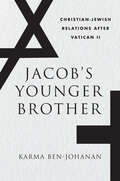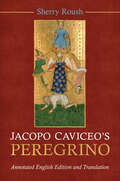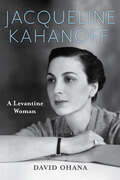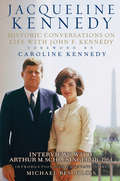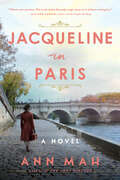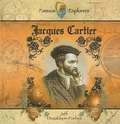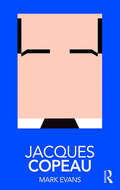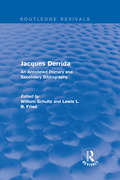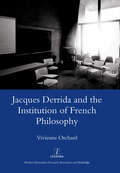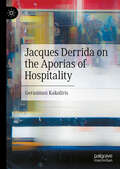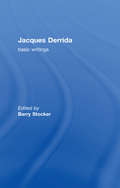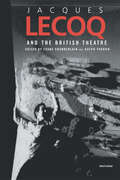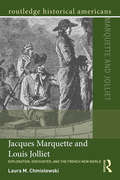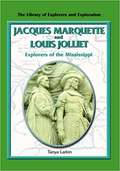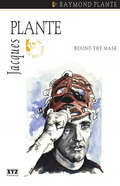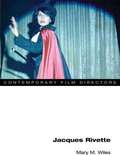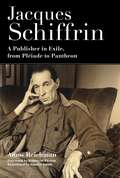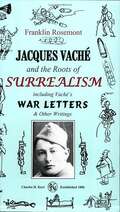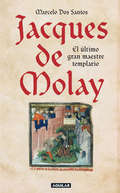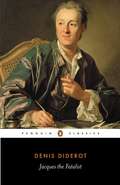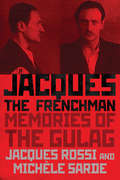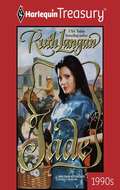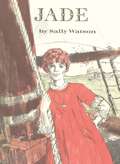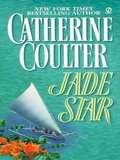- Table View
- List View
Jacob’s Younger Brother: Christian-Jewish Relations after Vatican II
by Karma Ben-JohananA revealing account of contemporary tensions between Jews and Christians, playing out beneath the surface of conciliatory interfaith dialogue. A new chapter in Jewish-Christian relations opened in the second half of the twentieth century when the Second Vatican Council exonerated Jews from the accusation of deicide and declared that the Jewish people had never been rejected by God. In a few carefully phrased statements, two millennia of deep hostility were swept into the trash heap of history. But old animosities die hard. While Catholic and Jewish leaders publicly promoted interfaith dialogue, doubts remained behind closed doors. Catholic officials and theologians soon found that changing their attitude toward Jews could threaten the foundations of Christian tradition. For their part, many Jews perceived the new Catholic line as a Church effort to shore up support amid atheist and secular advances. Drawing on extensive research in contemporary rabbinical literature, Karma Ben-Johanan shows that Jewish leaders welcomed the Catholic condemnation of antisemitism but were less enthusiastic about the Church’s sudden urge to claim their friendship. Catholic theologians hoped Vatican II would turn the page on an embarrassing history, hence the assertion that the Church had not reformed but rather had always loved Jews, or at least should have. Orthodox rabbis, in contrast, believed they were finally free to say what they thought of Christianity. Jacob’s Younger Brother pulls back the veil of interfaith dialogue to reveal how Orthodox rabbis and Catholic leaders spoke about each other when outsiders were not in the room. There Ben-Johanan finds Jews reluctant to accept the latest whims of a Church that had unilaterally dictated the terms of Jewish-Christian relations for centuries.
Jacopo Caviceo's Peregrino: Annotated English Edition and Translation (Toronto Italian Studies)
by Sherry RoushJacopo Caviceo’s Peregrino (1508) was a popular Renaissance prose romance in Italy, France, and Spain. Considered the first novel written for women, Peregrino relates the courtship of two young lovers from hostile households who succeed in doing what Romeo and Juliet, among others, could not: reconcile their families and marry without resorting to suicide. Peregrino features cameos of historical celebrities who interact with fictitious characters during their many adventures, which include a Mediterranean pilgrimage, courtly celebrations, funerals, legal trials, and a journey to the Other World. The book presents female agency in psychologically developed characters and contexts and includes allusions to previous literary masterpieces, such as Homer’s epics, Virgil’s Aeneid, and Dante’s Divine Comedy. This edition includes a detailed introduction and a biography of Jacopo Caviceo. Drawing on critical and comparative studies in a broad range of literary interests, the book sheds light on the emergence of the modern novel in the early modern period.
Jacqueline (Reinos de Romance, Libro 1): Cada Dama Tiene Una Historia
by Sandra KyleCada dama tiene una historia. Jacqueline: codiciada por un rey (reina el romance, libro 1) Ambientada en la Francia del siglo XVII durante el reinado de Luis XIV, la historia gira en torno a la heroína infelizmente casada, Jacqueline, y su relación con el rey Luis. Amiga desde hace mucho tiempo de la reina madre, Jacqueline ha sido el centro de los anhelos no expresados y no correspondidos del joven rey. Cuando Louis da a conocer sus intenciones, ¿podrá florecer su romance?
Jacqueline Kahanoff: A Levantine Woman (Perspectives on Israel Studies)
by David OhanaJacqueline Kahanoff: A Levantine Woman is the first intellectual biography of this remarkable Egyptian-Jewish intellectual, whose work has secured her place in literary pantheon as a herald of Levantine, Mediterranean, and transnational culture. Growing up Jewish in cosmopolitan Egypt in the 1920s and 1930s, Jacqueline Kahanoff experienced a bustling Middle East enriched by diverse languages, religions, and peoples who nonetheless were deeply connected to each other through history, business, daily practices, and shared landscape. At the age of twenty-four, Kahanoff immigrated to the United States. Her stories, essays, and short autobiographical novel attest to her penchant to cross boundaries, generations, social classes, sexes, and Western and Eastern constructs. After immigrating to Israel in the early 1950s, she critically addressed the country's "provinciality" and "ethnic nationalism" as seen through her conception of a transnational Levantine culture. Through many writings, Kahanoff set forth her distinctive vision of Israel as a Mediterranean country with a broad, multicultural Levantine identity. Drawing on an extensive array of sources, ranging from interviews with Jacqueline Kahanoff's acquaintances and contemporaries to unpublished writings, David Ohana explores her fascinating life and intellectual journey from Cairo to Tel Aviv. The encompassing vision of a Levantine Israel made Kahanoff the initiator of a different cultural possibility, more extensive than that offered in her time, and also, perhaps, than is offered today.
Jacqueline Kennedy: Historic Conversations on Life with John F. Kennedy
by Caroline KennedyIn 1964, Jacqueline Kennedy recorded seven historic interviews about her life with John F. Kennedy. Now, for the first time, they can be read in this deluxe, illustrated eBook.Shortly after President John F. Kennedy's assassination, with a nation deep in mourning and the world looking on in stunned disbelief, Jacqueline Kennedy found the strength to set aside her own personal grief for the sake of posterity and begin the task of documenting and preserving her husband's legacy. In January of 1964, she and Robert F. Kennedy approved a planned oral-history project that would capture their first-hand accounts of the late President as well as the recollections of those closest to him throughout his extraordinary political career. For the rest of her life, the famously private Jacqueline Kennedy steadfastly refused to discuss her memories of those years, but beginning that March, she fulfilled her obligation to future generations of Americans by sitting down with historian Arthur Schlesinger, Jr., and recording an astonishingly detailed and unvarnished account of her experiences and impressions as the wife and confidante of John F. Kennedy. The tapes of those sessions were then sealed and later deposited in the John F. Kennedy Presidential Library and Museum upon its completion, in accordance with Mrs. Kennedy's wishes.The resulting eight and a half hours of material comprises a unique and compelling record of a tumultuous era, providing fresh insights on the many significant people and events that shaped JFK's presidency but also shedding new light on the man behind the momentous decisions. Here are JFK's unscripted opinions on a host of revealing subjects, including his thoughts and feelings about his brothers Robert and Ted, and his take on world leaders past and present, giving us perhaps the most informed, genuine, and immediate portrait of John Fitzgerald Kennedy we shall ever have. Mrs. Kennedy's urbane perspective, her candor, and her flashes of wit also give us our clearest glimpse into the active mind of a remarkable First Lady.In conjunction with the fiftieth anniversary of President Kennedy's Inauguration, Caroline Kennedy and the Kennedy family are now releasing these beautifully restored recordings on CDs with accompanying transcripts. Introduced and annotated by renowned presidential historian Michael Beschloss, these interviews will add an exciting new dimension to our understanding and appreciation of President Kennedy and his time and make the past come alive through the words and voice of an eloquent eyewitness to history.
Jacqueline in Paris: A Novel
by Ann MahFrom the bestselling author of The Lost Vintage, a rare and dazzling portrait of Jacqueline Bouvier’s college year abroad in postwar Paris, an intimate and electrifying story of love and betrayal, and the coming-of-age of an American icon – before the world knew her as Jackie.In September 1949 Jacqueline Bouvier arrives in postwar Paris to begin her junior year abroad. She’s twenty years old, socially poised but financially precarious, and all too aware of her mother’s expectations that she make a brilliant match. Before relenting to family pressure, she has one year to herself far away from sleepy Vassar College and the rigid social circles of New York, a year to explore and absorb the luminous beauty of the City of Light. Jacqueline is immediately catapulted into an intoxicating new world of champagne and châteaux, art and avant-garde theater, cafés and jazz clubs. She strikes up a romance with a talented young writer who shares her love of literature and passion for culture – even though her mother would think him most unsuitable.But beneath the glitter and rush, France is a fragile place still haunted by the Occupation. Jacqueline lives in a rambling apartment with a widowed countess and her daughters, all of whom suffered as part of the French Resistance just a few years before. In the aftermath of World War II, Paris has become a nest of spies, and suspicion, deception, and betrayal lurk around every corner. Jacqueline is stunned to watch the rise of communism – anathema in America, but an active movement in France – never guessing she is witnessing the beginning of the political environment that will shape the rest of her life—and that of her future husband.Evocative, sensitive, and rich in historic detail, Jacqueline in Paris portrays the origin story of an American icon. Ann Mah brilliantly imagines the intellectual and aesthetic awakening of Jacqueline Bouvier Kennedy Onassis, and illuminates how France would prove to be her one true love, and one of the greatest influences on her life.
Jacques Cartier (Famous Explorers)
by Jeff Donaldson-ForbesBorn in a small fishing town in France, Jacques Cartier became an expert navigator and was chosen by King Francis I to lead an expedition in search of the elusive Northwest Passage. In this beautifully illustrated book, students will follow Cartier as he travels to Newfoundland, New Brunswick, and down the St. Lawrence River to the Iroquois village of Stadacona, which is now known as Quebec.
Jacques Copeau (Routledge Performance Practitioners)
by Mark EvansThis book examines Jacques Copeau, a leading figure in the development of twentieth-century theatre practice, a pioneer in actor-training, physical theatre and ensemble acting, and a key innovator in the movement to de-centralize theatre and culture to the regions. Noe reissued, Jacques Copeau combines: an overview of Copeau's life and work an analysis of his key ideas a detailed commentary of his 1917 production of Moliere's late farce Les Fourberies de Scapin – the opening performance of his influential New York season a series of practical exercises offering an introduction to Copeau's working methods. As a first step towards critical understanding, and as an initial exploration before going on to further, primary research, Routledge Performance Practitioners are unbeatable value for today's student.
Jacques Derrida (Routledge Revivals): An Annotated Primary and Secondary Bibliography
by William R. Schultz Lewis L.B. FriedFirst published in 1992, this book represents the first major attempt to compile a bibliography of Derrida’s work and scholarship about his work. It attempts to be comprehensive rather than selective, listing primary and secondary works from the year of Derrida’s Master’s thesis in 1954 up until 1991, and is extensively annotated. It arranges under article type a huge number of works from scholars across numerous fields — reflecting the interdisciplinary and controversial nature of Deconstruction. The substantial introduction and annotations also make this bibliography, in part, a critical guide and as such will make a highly useful reference tool for those studying his philosophy.
Jacques Derrida and the Institution of French Philosophy
by Vivienne Orchard"Jacques Derrida (1930-2004) was unquestionably one of the most celebrated and reviled French thinkers of the last thirty years. Outside France his influence in comparative literature circles, through deconstruction and other ideas, has been so profound that his personal role as a leader of contemporary French philosophy has been almost overlooked. Perhaps because there is no equivalent in English-speaking countries to the timetabling of philosophy in the French education system, writers on Derrida outside France have not fully appreciated the importance of this political and cultural struggle. In this ground-breaking book, Orchard examines a hard-fought debate of great importance not only to Derrida himself, but also to France's idea of what studying 'philosophy' might mean after the student uprisings of 1968."
Jacques Derrida on the Aporias of Hospitality
by Gerasimos KakolirisThe book systematically presents Derrida’s views on hospitality, as reflected in his texts and lectures from 1995 until his death in October 2004. Derrida’s engagement with hospitality is perhaps the most important and extensive philosophical attempt to respond critically to the growing hostility of many governments worldwide towards specific categories of foreigners, such as refugees and immigrants. Particular emphasis is placed on the ‘aporetic’ nature of hospitality that Derrida describes: namely, that, on the one hand, the provision of hospitality brings us face to face with the hyper-ethical ‘law’ of ‘unconditional hospitality,’ which requires the unconditional reception of the other, i.e. the provision of hospitality to the foreigner without conditions, restrictions or expecting anything in return. On the other hand, the provision of hospitality forces us to face the ‘conditional’ laws of hospitality, which, while establishing a right to and a duty of hospitality, simultaneously restrict hospitality by setting conditions for the arrival and stay of the foreigner. The book also analyses the ‘decision’ and the ‘event’ of hospitality, as well as the unresolved ‘aporia’ at the heart of the ethics of hospitality (or of ethics in general), an aporia or contradiction related to the fact that we cannot be hospitable towards a singularity without ‘sacrificing’ some other singularities. Attention is paid to Derrida’s attempt to open the provision of hospitality beyond humans, that is, to other living beings. Derrida’s views on hospitality are examined in the book in the light of the philosophical thought of Emmanuel Levinas, Immanuel Kant and René Schérer.
Jacques Derrida: Basic Writings
by Barry StockerOne of the most influential and controversial thinkers of the twentieth-century, Jacques Derrida’s ideas on deconstruction have had a lasting impact on philosophy, literature and cultural studies.Jacques Derrida: Basic Writings is the first anthology to present his most important philosophical writings and is an indispensable resource for all students and readers of his work. Barry Stocker’s clear and helpful introductions set each reading in context, making the volume an ideal companion for those coming to Derrida’s writings for the first time. The selections themselves range from his most infamous works including Speech and Phenomena and Writing and Difference to lesser known discussion on aesthetics, ethics and politics.
Jacques Lecoq and the British Theatre
by Franc Chamberlain Ralph YarrowJacques Lecoq and the British Theatre brings together the first collection of essays in English to focus on Lecoq's school of mime and physical theatre. For four decades, at his school in Paris, Jacques Lecoq trained performers from all over the world and effected a quiet evolution in the theatre. The work of such highly successful Lecoq graduates as Theatre de Complicite (The Winter's Tale with the Royal Shakespeare Company and The Visit, The Street of Crocodiles and The Causcasian Chalk Circle with the Royal National Theatre) has brought Lecoq's work to the attention of mainstream critics and audiences in Britain. Yet Complicte is just the tip of the Iceberg. The contributors to this volume, most of them engaged in applying Lecoq's work, chart some of the diverse ways in which it has had an impact on our conceptions of mime, physical theatre, actor training, devising street theatre and interculturalism. This lively - even provocative - collection of essays focuses academic debate and raises awareness of the impact of Lecoq's work in Britain today.
Jacques Marquette and Louis Jolliet: Exploration, Encounter, and the French New World (Routledge Historical Americans)
by Laura M. ChmielewskiIn this succinct dual biography, Laura Chmielewski demonstrates how the lives of two French explorers – Jacques Marquette, a Jesuit missionary, and Louis Jolliet, a fur trapper – reveal the diverse world of early America. Following the explorers' epic journey through the center of the American continent, Marquette and Jolliet combines a story of discovery and encounter with the insights derived from recent historical scholarship. The story provides perspective on the different methods and goals of colonization and the role of Native Americans as active participants in this complex and uneven process.
Jacques Marquette and Louis Jolliet: Explorers of the Mississippi (Library of Explorers and Exploration)
by Tanya LarkinA biography of the French explorers whose primary goal was to find the Northwest Passage, but who made their mark on history by exploring and charting the Mississippi River.
Jacques Plante
by Vladimir Konieczny Raymond PlanteJacque Plante, the first National Hockey League goalie to regularly wear protective facemask, was known for roving out of his net. "The Masked Marvel" won the Vezina trophy seven times and became a member of the Hockey Hall of Fame.
Jacques Rivette (Contemporary Film Directors)
by Mary M. WilesAs a pioneer of the French New Wave, Jacques Rivette was one of a group of directors who permanently altered the world's perception of cinema by taking the camera out of the studios and into the streets. His films, including Paris nous appartient, Out 1: Noli me tangere, Céline et Julie vont en bateau--Phantom Ladies Over Paris, La belle noiseuse, Secret défense, and Va savoir are extraordinary combinations of intellectual depth, playfulness, and sensuous beauty. In this study of Rivette, Mary M. Wiles provides a thorough account of the director's career from the burgeoning French New Wave to the present day, focusing on the theatricality of Rivette's films and his explorations of the relationship between cinema and fine arts such as painting, literature, music, and dance. Wiles also explores the intellectual interests that shaped Rivette's approach to film, including Sartre's existentialism, Barthes's structuralism, and the radical theater of the 1960s. The volume concludes with Wiles's insightful interview with Rivette.
Jacques Schiffrin: A Publisher in Exile, from Pléiade to Pantheon
by Amos ReichmanJacques Schiffrin changed the face of publishing in the twentieth century. As the founder of Les Éditions de la Pléiade in Paris and cofounder of Pantheon Books in New York, he helped define a lasting canon of Western literature while also promoting new authors who shaped transatlantic intellectual life. In this first biography of Schiffrin, Amos Reichman tells the poignant story of a remarkable publisher and his dramatic travails across two continents.Just as he influenced the literary trajectory of the twentieth century, Schiffrin’s life was affected by its tumultuous events. Born in Baku in 1892, he fled after the Bolsheviks came to power, eventually settling in Paris, where he founded the Pléiade, which published elegant and affordable editions of literary classics as well as leading contemporary writers. After Vichy France passed anti-Jewish laws, Schiffrin fled to New York, later establishing Pantheon Books with Kurt Wolff, a German exile. Following Schiffrin’s death in 1950, his son André continued in his father’s footsteps, preserving and continuing a remarkable intellectual and cultural legacy at Pantheon. In addition to recounting Schiffrin’s life and times, Reichman describes his complex friendships with prominent figures including André Gide, Jean-Paul Sartre, Peggy Guggenheim, and Bernard Berenson. From the vantage point of Schiffrin’s extraordinary career, Reichman sheds new light on French and American literary culture, European exiles in the United States, and the transatlantic ties that transformed the world of publishing.
Jacques Vache and the Roots of Surrealism: Including Vache's War Letters & Other Writings
by Franklin RosemontLiterary Nonfiction. Fiction. Biography. Conscripted into the French Army in World War One, Jacques Vache soon became not only the unsurpassed champion of "Desertion from Within," but also the master of "Disservice with Diligence." His post-humous slim book, War Letters (1919)--included in the present volume--is a classic of surrealist anti-militarism and subversion. Renowned as the Inventor of Umour (Humour without the H), Vache was--along with Isidore Ducasse, Comte de Lautreamont--the major inspirer of Andre Breton and the surrealist revolution. The first of its kind in English, this book chronicles Vache's boundless originality, creative nonconformity, revolutionary morality (or umoral-ity), and his all-out turn-the-world-upside-down hilarity. Welcomed by Andre Breton himself into the Paris Surrealist Group in 1966, Franklin Rosemont took part in the Paris group's activities for several months and went on to co-organize the Chicago Surrealist Group later that year. Rosemont (1943-2009) died earlier this year.
Jacques de Molay: El último gran maestre templario
by Marcelo Dos SantosConozca en este nuevo libro de Marcelo Dos Santos, autor de El manuscrito Voynich, la odisea de Jacques de Molay, último gran maestre de la Orden de los Templarios. A principios del siglo XIV la sociedad europea veía el imparable avance de las órdenes monásticomilitares. Los principales de entre estos miles de monjes guerreros eran los Caballeros Templarios (orden fundada en la Jerusalén recién conquistada en la cruzada) quienes fundaron verdaderos imperios espirituales y económicos en las sociedades europeas de su época. De estricta observancia religiosa, obediencia ciega a los reyes y al papado, valor a toda prueba y un enorme espíritu de sacrificio, los Templarios estaban obligados a aceptar el combate de uno contra tres, no podían comprar sus vidas con rescates si caían prisioneros y se les exigía cumplir con otras severísimas reglas. Además de ello, debían someterse a los tres votos tradicionales de los religiosos cristianos: obediencia, pobreza y castidad. Encontraron tiempo aún para dedicarse a la producción agrícola, a la construcción de muchas de las grandes catedrales europeas y a financiar grandes proyectos y emprendimientos. A pesar de todas sus virtudes, sin embargo, un buen día cayeron en desgracia y fueron aniquilados.
Jacques the Fatalist and His Master
by Denis Diderot Martin Hall Michael HenryThe world of Jacques is not a fixed and settled one where events are easily assessed and interpreted; on the contrary, it is a world of dizzying variety and unpredictability. For nothing is quite as it seems and an alarming proliferation of anecdotes, characters and philosophical problems continues to spring up around the apparently central theme of the relationship between Jacques and his master, in a skilled and devastating assault on the supremacy of the stylized novel. Book jacket.
Jacques, the Frenchman: Memories of the Gulag
by Jacques Rossi Michele SardeJacques Rossi is one of Stalin’s most well-known victims. Author of The Gulag Handbook, a fascinating encyclopedia of the Soviet forced labor camps, Rossi spent twenty years in interrogation, prison, and Gulag detention. Born to a prominent Polish father and French mother, the young Jacques became attracted to communism as a blueprint for radical social reform. He spent years in the communist underground in interwar Europe, agitating for the revolution, but he was arrested during Stalin’s Great Purges in 1937. This book represents a conversation between Jacques Rossi and Michèle Sarde, professor emerita at Georgetown University, and weaves together personal reflections and historical analysis. Rossi’s remarkable life (1909–2004) spanned the twentieth century and sheds important light on the tumultuous history of Europe – the appeal of communism in the interwar period and beyond, the mentality of party members, the effects of mass repression, everyday life in Stalin’s Gulag, and the problem of rights for former prisoners during the Khrushchev era. As he abandoned his internationalist communist beliefs, Rossi increasingly identified as French, embracing the name his fellow prisoners gave him in the Gulag, "Jacques the Frenchman." Rossi’s reflections on his own political beliefs, his frustrations with those who could not accept the truth of his brutal experiences in the Soviet Union, and his life as a witness to one of the twentieth century’s worst crimes offer a fascinating history of Stalinism and its legacies.
Jade
by Ruth LanganThe Town Preacher And The Town Madam...Haunted by his sordid past as the notorious gunslinger Nevada, Reverend Wade Weston had declared war against sin in the small town of Hanging Tree, Texas. But he hadn't counted on the arrival of the exotic Jade Jewel, whose visions of building a pleasure palace threatened the peace of the community, and whose person aroused in him passions that threatened to claim his immortal soul.Diamond, Pearl, Jade and Ruby, The Jewels of Texas. Four sisters as wild and vibrant as the untamed land they fought to protect.
Jade (Sally Watson Family Tree #6)
by Sally WatsonHer name was Melanie Lennox, but she preferred to be called Jade. "Swords, adventure, freedom," sixteen year old Melanie cried," and I'll pay any price!" Driven by her courageous, independent spirit and hatred of slavery, Jade attempts to release a ship's cargo of slaves destined for bondage in Virginia. While she is being publicly flogged for her efforts, the ship is captured by pirates, and Jade, undaunted and realizing her opportunity for adventure, decides to join them.
Jade Star
by Catherine CoulterVowing to save a young girl from her painful past, Saint Morris marries her out of duty. He thinks of himself as her protector and brother. But she has other ideas....
